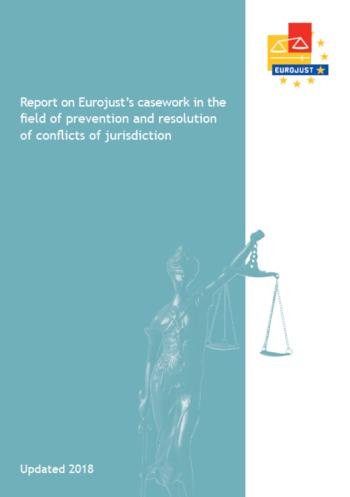
This report provides an update of a report issued in 2015 concerning Eurojust’s experience in the field of prevention and resolution of conflicts of jurisdiction. The report is based on Eurojust’s casework, a College thematic discussion, meetings organised or co-organised by Eurojust and contributions made by Eurojust. It specifically covers the period from 2009 to 2017.
After outlining the legal framework for Eurojust’s involvement, this report addresses Eurojust’s casework in the field of prevention and resolution of conflicts of jurisdiction from four different perspectives:
- Identification and coordination of parallel proceedings: parallel proceedings are considered very beneficial for combating cross-border crime, provided that Member States coordinate their actions. Eurojust provides support to the national authorities to identify or even trigger parallel proceedings, ensure coordination – particularly via coordination meetings – and find common solutions.
- Jurisdictional issues and decisions on which jurisdiction should prosecute: in most Eurojust cases, conflicts of jurisdiction are settled between the national authorities during level II meetings and, especially, coordination meetings in which the most appropriate solution is found. Sometimes, Eurojust issues recommendations through its National Members, individually or jointly, indicating which Member State is in a better position to prosecute. In this regard, the Eurojust Guidelines for deciding ‘which jurisdiction should prosecute?’, revised in 2016, are considered a useful tool in view of their flexibility and logical approach.
- Transfer of criminal proceedings: Eurojust’s casework confirms that, in the absence of a specific EU instrument dealing with transfer of proceedings, practical and legal difficulties (e.g. translation cost and quality, differences between Member States in substantive and procedural criminal law, etc.) can arise. In these cases, Eurojust’s support is requested by the national authorities to facilitate the day-to-day practice.
- Principle of ne bis in idem: Over the years, Eurojust has experienced that issues related to the application of the principle of ne bis in idem might be significant and need appropriate and practical solutions within a reasonable time. Eurojust’s support helps to detect and consequently avoid the occurrence of ne bis in idem situations. In these cases, such issues are also properly examined in level II meetings or coordination meetings.
